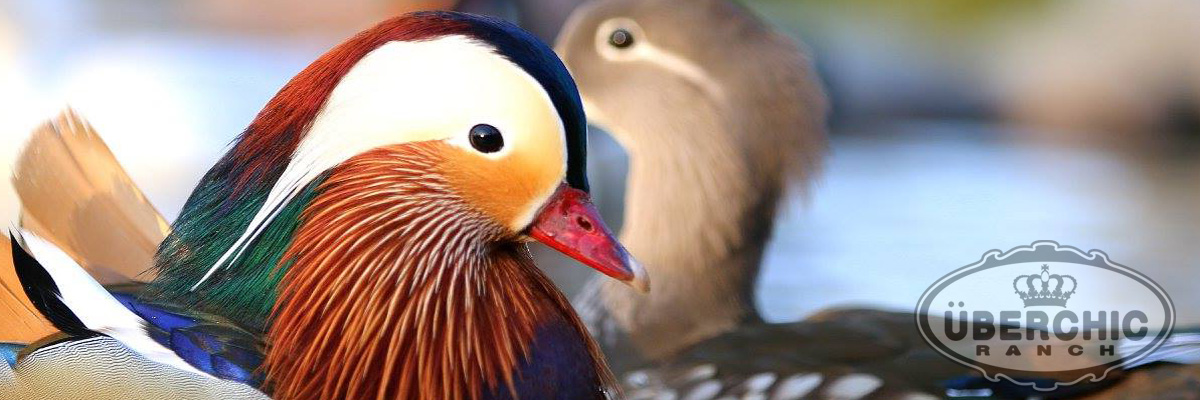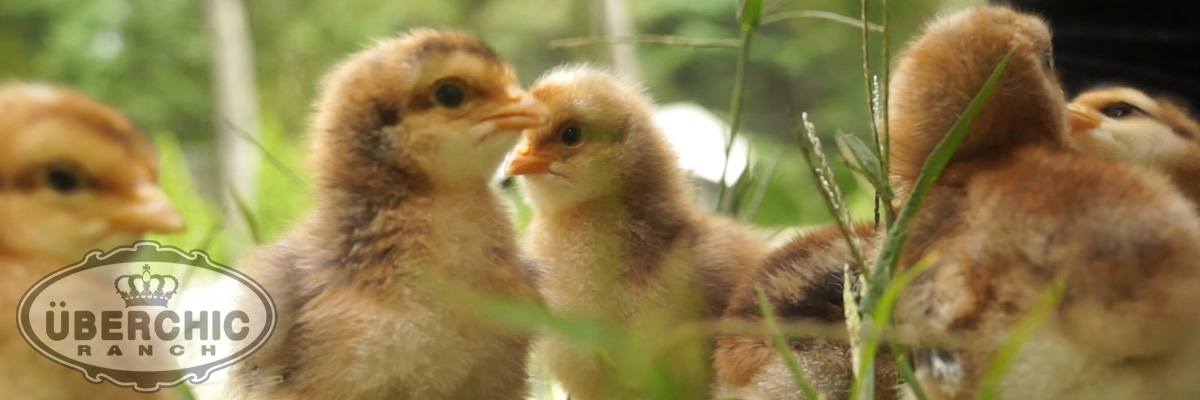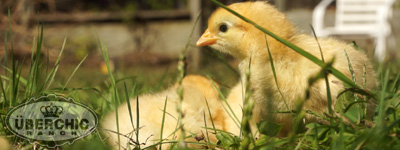-
How long does it take to hatch eggs?
It varies depending on the species of bird. Chickens are 21 days, most Ducks are 28 days, Geese are 28-35 days with some taking 3 days extra to hatch, Pheasants are 24-25 days, and Quail are 14-23 days. You should look up breed-specific so you know how long to incubate. You should also candle eggs after about 7 days to check whether it's fertile or not.
-
Do you sell hatching eggs?
At this time, for quality control purposes, we do not sell hatching eggs for chickens, ducks, or geese. We do offer hatching eggs for some of our pheasants and quail. Please contactus@uberchicranch.com for more info.
-
Ah c'mon! Why don't you ship chicken eggs?
Let me just say that this is the USPS training video...
-
What should I do when my chicks / ducklings arrive?
That's an excellent question! Typically, chicks and ducklings are ok for the first 24-48 hours without food because they have recently absorbed the egg yolk before they hatched. It takes about 2 days for the newly-hatched fledglings to arrive. When you "receive" the birds, you should immediately introduce them to water and then food. You can do this by picking up the fledgling by placing your middle finger between their legs. This should cradle them but also keep them secure. Then, with your thumb, gently press their head down until their beak / bill touches the water. Their natural instincts will kick in and you'll watch their heads go up to drink (chicks) or their bills begin to dabble (ducklings). Repeat this process with the food. They may not eat it, but dipping their beaks / bills into the food will surely pique their interest. I wouldn't mind if someone dipped my nose into pizza...or baklava.
-
What is Autosexing?
It is a method to immediately determine whether a chick is male or female, but is not to be confused with sex-linking. For commercial purposes, females are typically preferred over males since hens produce eggs and can be later used for meat. For sexing chickens, other alternatives were being used at the time. It wasn't until Dr. Reginald Punnett of Cambridge University, a geneticist, proved his hypothesis that through genetics, chicken gender can be determined immediately upon hatching.
-
What is the difference between "Autosexing" and "Sex-linking?"
A sex-linked chicken, like the Black Sex-Link, is a hybrid of 2 different breeds. If you were to breed those birds, the sex-linking trait will no longer exist. However, an auto-sexed chicken, like Bielefelders and Niederrhieners, are not hybrids. You can autosex the offspring for generations after generations. So autosexed birds are true breeds since the offspring will breed true. Autosexing is still an uncommon practice in the United States since we took to sex-linking. Other parts of the world, like Europe, favor autosexing. C'mon, 'Merica! Let's add some European handling to our bold, American genes!
-
How do you autosex Bielefelders?
The females have a "chipmunk" pattern on their back. The ladies like to put on, what we call, "mascara" over their eyes. (It's a black stripe that goes horizontally passed their eyes). Males have a creamy-yellow spot on top of their heads, as if they are crowning themselves! They know they're champs and of royal-proportions. Males also have more of a cinnamon-colored body.
-
How do you autosex Niederrheiners?
Most breeders of Niederrheiners have trouble distinguishing males from females once they are hatched. Some wait for 2-3 months until the difference between pullets and cockerels become obvious. Überchic Ranch is determined to settle this once and for all. We have detected a pattern and are currently collecting data so that when we predict gender 100% of the time, we will publish our findings. Please check back again soon. Be sure to like our Facebook page, subscribe to our YouTube channel, and join our eNewsletter so that you can be one of the first to be informed!
-
Do Bielefelders have white earlobes?
NO! This is not a pure Bielefelder! None of the breeds used to create the Bielefelder had white earlobes. Unfortunately, there are scammers out there that are really "sellers" rather "breeders," where a breeder truly cares about the standards and performance of the breed. To learn more about how to visually tell if it's not really a Bielefelder, read this information.
-
Do you only sell Day Old Chicks and Ducklings?
We sell birds at various ages including, but not limited to, 1 Month, 2 Month, 3 Month, 6 Month, 1 Year, and 2 Year. Availability varies and typically sells out fast. That's why we suggest Pre-Ordering so that you can be one of the first in line for the following season.
-
Can you have chickens, gamebirds, and waterfowl all in the same pen or aviary?
This depends on the breed and species of bird. Some are "communitiy" birds; others are too aggressive and should have their own enclosure. Even though we have coummunity birds at Überchic Ranch that get along nicely, certain situations, like type of enclosures, could affect the overall psyche of your birds. If there's sunlight, a dry shelter, plenty of clean food and water, and an area to stretch their wings, the birds are typically happy and harmonious with their other feathered neighbors. However, a disease known as "blackhead" can become an issue. It's essentially a protozoan (a single-celled animal that is parasitic in nature) which could cause various health issues and even death among members of your flock. It would be best to de-worm the birds and sanitize the place frequently so that you minimize blackhead from occurring.
-
Can you have different species of quail, pheasants, and waterfowl in the same pen or aviary?
No! We do not recommend mixing different species of gamebirds and waterfowl. We're not speciesist. The reason being is that many species of pheasants, quail, and waterfowl can crossbreed, thus yielding mixed offspring. This practice is breaking a cardinal rule in aviculture. It is a sure way to jeapordize all species involved since it ruins pure genetics! If you like to have more than one species of gamebirds or waterfowl, we highly recommend building another pen, aviary, or other enclosure. Quail, for example, can thrive in bunny hutches, just as long as they are not overcrowded.
-
When will my pullets (young hens) begin to lay eggs?
I don't blame you for asking. I'm sure you're tired of store-bought eggs where "fresh" applies more to the cashier ringing your eggs than the eggs themselves! This is another great question but also depends on various factors. This is assuming they are not coming of age in the dead of winter when your snowbanks eclipse your house, or they are being scorched by 100+ degree weather to the point where they prefer to be seeing grill marks rather sun tans. All kidding aside, the weather and the amount of sunlight do play major roles in when your hens begin to lay. Assuming you have ideal weather, pullets generally become hens when they lay their first egg around 6 months. But just like humans, these girlies are fresh out of the gate. It's completely normal if they don't want to have chicks running around at 6 months. Some wait until they are 1 year old to start having "baby bumps." Seriously!
-
How often should I feed my birds?
Whenever someone asks me that, I think of Mary Poppins when the beggar is asking you to feed the birds — toppins a bag. Well, as far as ornamenetal waterfowl and gamebirds, these animals still have a "wild" instinct. They typically love to scavenge and forage throughout the day. Chickens...however...are porkers. They'll binge eat as long you keep shovelling food to them. Toppins? Hmph! It's all about the Benjamins with chickens! They'll eat almost anything...filet mignon, fried green tomatoes, foie gras shabu shabu, truffled gnudi — the list goes on! Italian? Mexican? Japanese? These birds love it all! Just be careful with spices. They may drop the chalupa if it's muy caliente. So if you are seriously concerned that your chickens are becoming obese, you can ration the chicken feed. Before doing so, I'd consult your veterinarian to make sure your bird is receiving too much nutrition. If not, then make sure the chicken feed is always available and clean. See how long i.e. one large feeder lasts you. If it's only 1 day, then you know you need to replenish the feeder once every day.
-
Is it ok to feed my birds treats?
Well what do you mean by "treats?" I mean, if all you're feeding them is their grain food then anything would be considered a treat! Look at their grain food as if you were eating cereal every day for 3 meals a day, every day. You'd go a little crazy too, right? Maybe a bit hangry? If your birds are able to get outside of their shelter, they already have a chance of eating bugs. Gamebirds especially need more protein than domesticated chickens. If you want to buy any live bugs like crickets, mealworms, nightcrawlers, your birds will love you! Green grass or other greens that are not chemically-treated are also ok. Think organic, baby! Cracked corn? Whole corn? It's just like fresh from-the-vine versus canned goods — you'll only get the maximum nutrition if it is whole and not processed. So whole corn whether it's at your grain store or in your grocery is more nutritional while cracked corn is not at all. That's cash in the trash. Do you have leftovers from your table that's been in a cryogenic state in your fridge or freezer? Bust that out and create a bird buffet! Let the rest go to compost. We also enjoy giving a proprietary blend of seeds that would be great for any of our birds. Is there room for dessert? Well...any artificial sugar is not good for the birds (or for you in large quantities for that matter). It could cause diabetes or other diseases. So stick to fruits, but drop the tiramisu. We wouldn't want their beaks to fall off. They don't have dental coverage.
-
Where do you ship live birds to?
As of now, we regularly ship to the 48 Continental U.S. States. We will consider shipping to Hawaii and Alaska upon special request. We currently do not ship International orders.
-
Can I release birds into the wild?
You can. But your local and State...maybe even Federal governments won't be too happy. We suggest contacting your local and State governmental agencies first to see if it is ok to release birds. Most agencies require that you have a special permit and / or license. Secondly, which should be the initial question, is "what kinds of birds you plan on releasing and why?" We say this because some of the birds we carry are not native to the United States and, therefore, should not be released into the wild in the U.S. because the feral species could negatively affect native species and our native ecosystem. There are already many cases where feral animals have wreaked havoc on our ecosystems. "OK, well what about releasing native species?," you say. Again, after consulting your local and State governmental agencies, and once you receive your permit and / or license, the question should now be, "why should I release native birds into my area?" What is your motivation behind this? If it is for hunting reasons, we recommend a co-op with your local hunting grounds and / or sportsmen clubs. If you want to generally help with the numbers of your local species, then that's ok too if you have the proper documentation that proves you can do that. These are merely suggestions. It would also be wise to consult your local attorney that specialises in environmental law.
-
What is "permaculture?"
Permaculture is an agricultural process that essentially creates an ecosystem among flora and fauna so that nothing goes to waste, thus being a more natural and healthier way of growing food for human consumption since there is no need for harsh chemicals, therefore is better for the environment, and treats animals more humanely.
-
Is permaculture "the old way" of doing agriculture?
Yes and no. Historically, farmers in any region of the world typically grow few crops. In the U.S., corn and soybean were the two most common crops grown and are still the two most common today. So, this is more like monoculture. Permaculture is considered "new technology" within agriculture, being less than 100 years old. Considering humanity's time on Earth, this really puts things into perspective.
-
Do you need a coop with a chicken run?
-
Should I heat my coop in the Winter?
-
How many laying hens for a family of four?
-
Can my chickens free range in my yard?
-
Will my cat or dog hurt my chicks?
-
How to properly heat your chicks?
-
How to water your chicks?
-
Will my cat or dog hurt my chicks?
-
Have you heard?
The bird's the word!



